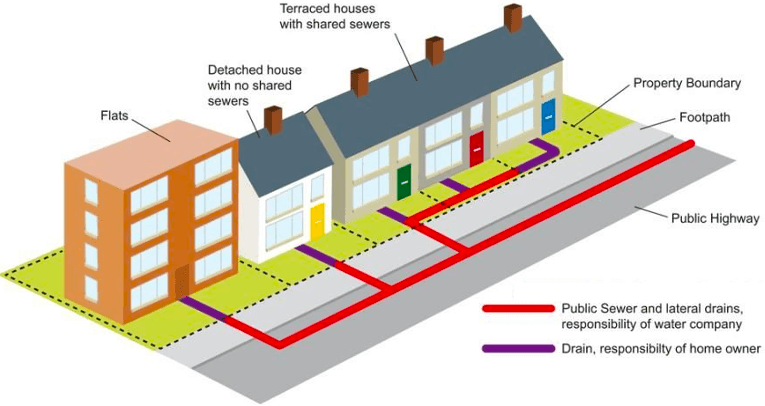Blocked drains on public roads can lead to flooding, damage, and safety hazards. However, knowing who is responsible for clearing these blockages can be confusing. In this guide, we’ll clarify the roles and responsibilities for blocked road drains in the UK, how to report blockages, and what steps you can take to prevent these issues.
If you’re dealing with drainage issues on your own property, Rapid Drains offers reliable services such as septic tank emptying, blocked drain clearance, and CCTV drain surveys.
Navigation
- Who Is Responsible for Blocked Drains in the Road?
- What Are Road Drains and Why Do They Get Blocked?
- Who Is Responsible for Clearing Blocked Road Drains?
- How to Report a Blocked Drain in the Road
- List of UK Water Authorities by Region
- Additional Tips to Prevent Blocked Drains
- When to Call a Professional Drainage Service
- Conclusion
Who Is Responsible for Blocked Drains in the Road?
Understanding who is responsible for clearing blocked road drains can help ensure these issues are addressed quickly and effectively. In the UK, local councils or highway authorities typically maintain and clean public road drains (also known as gullies) to prevent flooding, maintain road safety, and protect public infrastructure.
For insights into who handles private drainage issues, check out our related article on blocked drains and who is responsible for repairs and maintenance.
What Are Road Drains and Why Do They Get Blocked?
The Role of Road Drains
Road drains collect rainwater from roads and pavements, directing it into the larger sewer system. Located along curbs and slopes, they are essential for preventing water buildup on roads and reducing the risk of accidents or damage.
Common Causes of Blockages
- Natural Debris: Leaves, mud, and branches are common culprits, especially in autumn.
- Litter and Waste: Plastic bottles, wrappers, and other litter often block road drains.
- Oil and Grease: Vehicle runoff can leave behind oil and grease that coat drain interiors.
- Sediment Buildup: Over time, dirt and sediment can restrict water flow.
- Tree Roots: Roots can infiltrate and damage drainage pipes, causing blockages.
Blocked road drains create hazards such as slippery surfaces, road damage, and flooding, so timely maintenance is essential.
Who Is Responsible for Clearing Blocked Road Drains?
Local Councils and Highway Authorities
In the UK, local councils or highway authorities are responsible for maintaining road drains under the Highways Act 1980, which requires them to keep highways safe and drainage systems functional. Councils often have dedicated drainage teams for regular inspections, cleaning, and emergency repairs.
Responsibilities of Homeowners
While councils handle public road drains, homeowners are responsible for private drains or those exclusively serving their property. If your property is experiencing a drainage issue, Rapid Drains provides home drainage solutions and septic tank services.
How to Report a Blocked Drain in the Road
Reporting to the Local Council
If you encounter a blocked drain on a public road, it’s important to report it to your local council or highways department. Many councils offer straightforward reporting tools via their websites or dedicated contact numbers. Here’s how:
- Note the Location: Document the drain’s exact location, including landmarks or addresses.
- Use the Council’s Online Reporting Tool: Many councils offer online reporting forms or phone lines for drain issues.
- Provide Details: Describe the blockage (e.g., leaves, litter) and mention if it’s affecting road safety.
After reporting, the council assesses the situation and prioritizes maintenance as needed.
What to Do If the Council Delays Action
If the blocked drain is creating a hazard and isn’t being addressed, you can:
- Follow Up: Contact the council’s highways department again.
- Request Urgent Attention: Emphasize the safety risk.
- Contact Local Representatives: If necessary, escalate the issue to a local MP or councillor.
Local Water Authorities by Region
If the blockage is outside your property or in a shared drain, contact your local water company. Here are some helpful links to the main water authorities across the UK:
- Anglian Water: www.anglianwater.co.uk
- Northumbrian Water: www.nwl.co.uk
- Severn Trent Water: www.stwater.co.uk
- Southern Water: www.southernwater.co.uk
- South West Water: www.southwestwater.co.uk
- Thames Water: www.thameswater.co.uk
- United Utilities: www.unitedutilities.com
- Welsh Water (Dŵr Cymru): www.dwrcymru.com
- Yorkshire Water: www.yorkshirewater.com
- Scottish Water: www.scottishwater.co.uk
If you’re unsure which authority to contact, your water bill or the property’s previous owner should be able to confirm it.
For specific contact details, visit each water authority’s official website.
Additional Tips to Prevent Blocked Drains
Everyone can contribute to preventing blockages by taking small, proactive steps:
- Dispose of Waste Properly: Avoid littering and encourage responsible waste disposal.
- Educate on Safe Disposal of Oils: Remind businesses and residents to dispose of oils and chemicals properly rather than pouring them down drains.
- Regular Garden Maintenance: Clearing leaves and debris from areas around drains can help prevent blockages.
When to Call a Professional Drainage Service
If you’re dealing with a drainage issue on private property, consider calling a professional service like Rapid Drains. We offer services including CCTV drain surveys, blocked drain clearance, and septic tank emptying to help homeowners maintain efficient drainage systems.
Conclusion
Understanding who is responsible for blocked drains in the road is essential for resolving issues effectively. Local councils or highway authorities are usually responsible for maintaining public road drains, while property owners handle private systems. For blocked drains on private property, it’s beneficial to contact a certified drainage service like Rapid Drains for professional support.
By addressing drain blockages promptly, we can all help maintain safer roads, prevent environmental damage, and avoid costly repairs. Whether you’re a property owner or simply a responsible citizen, your efforts make a positive difference in keeping our roads clear and safe.

